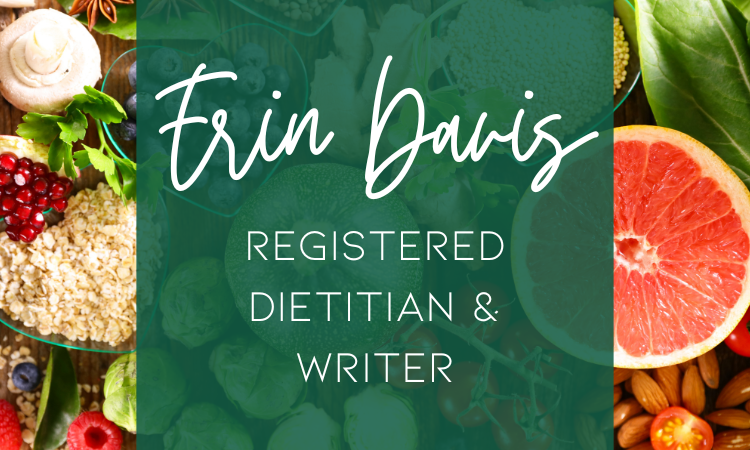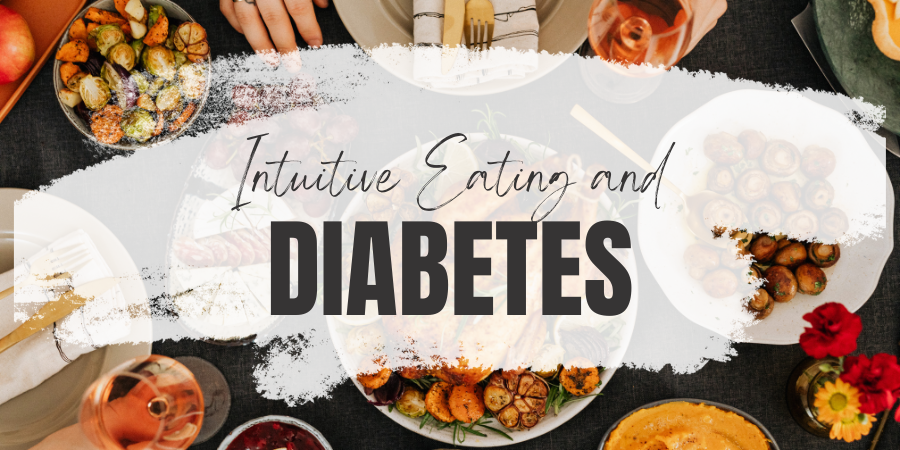Intuitive eating is a great idea, but what about if you have diabetes? Can you still eat intuitively if you have gestational, type 1, or type 2 diabetes? The answer is YES! Today I’m going to share how you that intuitive eating and diabetes can go together.
Diabetes is a condition that comes with flippant diet advice. “Watch your carbs”, “Just be careful with your diet”, “Eat a low-carb diet”, and more.
These casual recommendations are rarely paired with diet education. You are told to watch your diet and then sent on your way.
Now the internet has become your diet counselor. You see things like keto and intermittent fasting, or an even more extreme carnivore diet.
There are plenty of before and after pictures seemingly displaying success. But what happens 6-12 months down the road? Usually, people gain the weight back.
If you’ve tried any of these diets, you may have experienced near-disordered eating with little improvement in your health. Maybe you’re a chronic dieter who wants off of the binge-restrict cycle.
New here? I’m Erin, an intuitive eating registered dietitian and diabetes care and education specialist passionate about ditching diets.
What if I told you that you can embrace intuitive eating, even if you have diabetes? Or that you didn’t have to give up your favorite foods?
In this post, I’m sharing why restrictive diets aren’t the answer. I’ve also got some research that supports intuitive eating for diabetes.
Disclaimer: Some of the links are affiliate links, meaning I may earn a small commission should you click on the link and purchase the recommended item. Thank you for your support!
What is intuitive eating?
Intuitive eating is a non-diet approach created by Evelyn Tribole and Elyse Resch. They were so passionate about their work, that they published books and set out to train other professionals.
Based on a set of 10 principles, intuitive eating is meant to focus your attention on your hunger and fullness cues, heal your relationship with food, and honor your body in the process.
I’ve written a more in-depth post about making peace with food, but in summary, the 10 principles of intuitive eating include:
Reject diet mentality
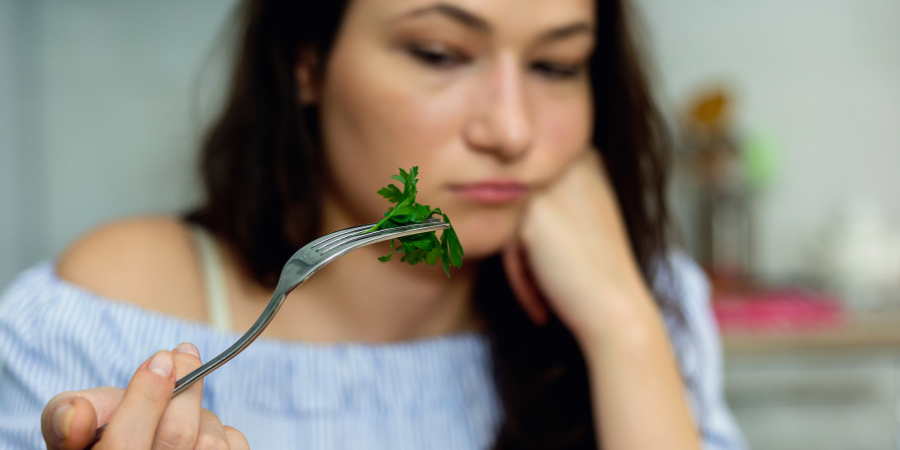
Dieting takes up valuable brain space, consuming our thoughts with food restrictions. And diet culture is EVERYWHERE!
Diet culture encompasses a set of beliefs and practices that prioritize thinness, equate it with health and beauty, and promote restrictive eating patterns.
And with diabetes, you may encouraged to diet more than someone without diabetes. Maybe at every follow-up visit with your primary care provider or endocrinologist.
Those restrictions rarely work in the long term. Our bodies tend to work against restriction and we end up binge eating and feeling guilty about it.
Low-carb dieting and fasting are associated with increased carb cravings. So the very thing that is supposed to “help” you, is making your blood sugars harder to manage.
You kick dieting to the curb when you eat intuitively.
Honor your hunger

One of the reasons diets don’t work is that you get hungry, right? And we often see that as some sort of failure or weakness.
You are not weak, you don’t lack willpower. Your body is meant to be hungry. (Want to read more about the different types of hunger?)
Instead of ignoring your hunger and then later overeating (delayed eating does cause weight gain), you eat when you are hungry.
Make peace with food
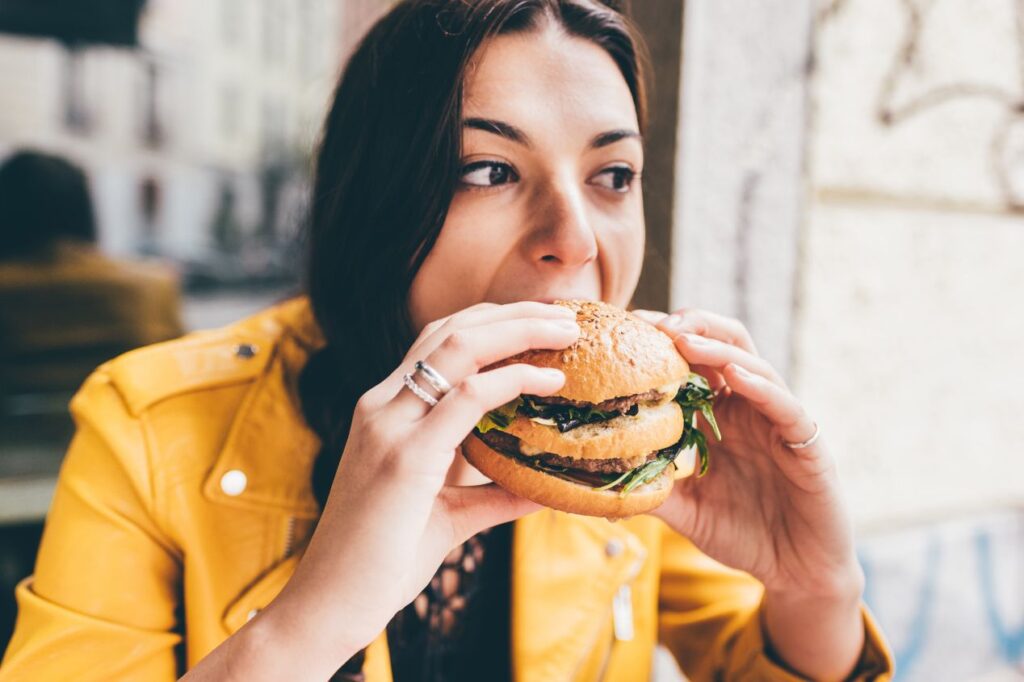
Almost all of the people I work with who have diabetes are uncomfortable with carbohydrates. Why? Years of being told they are bad.
We see it in the media, social networks, family potlucks, pretty much everywhere. Furthermore, you may be afraid to eat certain foods because of what it may do to your blood sugar.
Research proves that you can achieve optimal blood glucose levels without restriction.
With intuitive eating, you allow yourself to eat the foods you love. You eat them mindfully, enjoying every bite. All food is equal and eaten without moral judgment.
Challenge the food police

“Food police” refers to the tendency of some people to scrutinize and make unsolicited comments or judgments about others’ food choices based on their personal beliefs, dietary preferences, or perceived health standards.
Of course, this has an impact on your relationship with food. Eating is associated with shame and guilt.
The food police is that inner voice that tells you a food is good or bad. It also tells you to stop when you are still hungry or to ignore your hunger altogether.
During your intuitive eating journey, you’ll determine where you’re exposed to food policing and learn to challenge it.
Respect your fullness

Just like honoring your hunger cues, you’ll listen to your body and stop eating when you’re full.
If you’ve been dieting long, you’ll likely have experienced eating past fullness. Dieting disconnects us from our biological cues and often leads to binge eating.
When you binge, you know that your blood sugars will be difficult to control.
Part of this step is removing distractions from mealtime. You’ll stop eating when you’re comfortably full and not feel guilty about it.
Discover your satisfaction factor

When was the last time you ate your favorite food? Do you even remember what foods you love the most?
Time to rediscover those delicious foods you’ve been avoiding. Intuitive eating allows you to eat the foods you enjoy.
Afraid you’ll not be able to stop eating when you’ve started? I promise food will not have the hold on you as it does during dieting.
The key is habituation. You allow yourself a food that you love. Eat it as much as you want, whenever you want. You’ll be surprised that it doesn’t take long before you can ignore that food in your pantry.
Honor your feelings without food

Do you use food to cope with emotions? Happy—celebrate with drinks. Sad—eat a pint of ice cream. Stressed—eat a bag of chips. The list goes on.
Everyone is better off eating because they are physically hungry, instead of eating emotionally. And how do we even start eating emotionally? Restriction!
This study reveals that high dietary restraint (restriction) is a cause of emotional eating. Forbidden foods become a comfort for us when we are sad, stressed, angry, happy…you name it.
Respect your body

Do you struggle with bad body image days? Most people do. Especially in this age of influencers and constant comparison.
What do you appreciate about your body? Is there something about diabetes that has made you grow in wisdom or strength? Lean into the positive!
Can you accept your body as it is? Could you focus on health-giving behaviors instead of making your body smaller?
Exercise—feel the difference

Exercising is not a punishment for high blood sugars. Instead, you find movement you enjoy and want to do.
You listen to your body and do what you can. Explore different types of physical activity until you discover a favorite way to move.
It doesn’t have to be in the gym or on a treadmill. Here are some workout ideas for busy moms that apply to anyone who struggles to fit in physical activity.
Honor your health with gentle nutrition

Of course, what you eat is important. But I like to focus on adding in nutrient-dense foods, rather than taking away foods.
Diet patterns like the Mediterranean Diet have proven to be beneficial for those with diabetes. So how can you add in more whole grains, fish, veggies, and fruits?
These nourishing foods do not have to be paired with restrictions. You can eat foods that honor your health, without dieting.
Intuitive eating and diabetes research
It may seem impossible—managing diabetes without dieting—but I assure you that it can be done.
I already mentioned the glucose-lowering effects in type 2 diabetes. The research on intuitive eating is strong and shows promise as a non-restrictive treatment option.
Intuitive eating also improves body satisfaction in those with type 2 diabetes.
What about gestational diabetes? Not only can intuitive eating improve glucose levels in gestational diabetes, but there are also postpartum benefits. (Need some breakfast or dessert ideas?)
This study looked at diet quality, postpartum BMI, and insulin sensitivity in those who ate according to hunger and fullness cues—a mainstay of eating intuitively. Turns out intuitive eating improved all measures!
Additionally, in adolescents with type 1 diabetes, intuitive eating is associated with better glycemic control.
You can eat carbs when you have diabetes!

Carbs help fuel your body and they taste good. We have a difficult time avoiding them. Perhaps you can do it for a while, but before long the cravings are too much to handle.
When you cave in, you cave in big. Now what might have been a brownie for dessert is the whole pan of brownies.
So while you can have some low-carb days, your “off days” will lead to wild swings in your glucose levels.
So how do you eat carbs without having high blood glucose levels? First, regularly feed your body, not going more than 4-5 hours without food—except when sleeping.
When your blood sugars dip low, and you are starving, what do you crave? It’s not usually broccoli. You want quick energy foods—sugary snacks or chips maybe.
However, when you avoid that voracious hunger and take the time to prepare a mixed meal of carbs, protein, and fat, you’ll likely eat a much more moderate amount of carbs and calories throughout the day—resulting in more stable glucose levels.
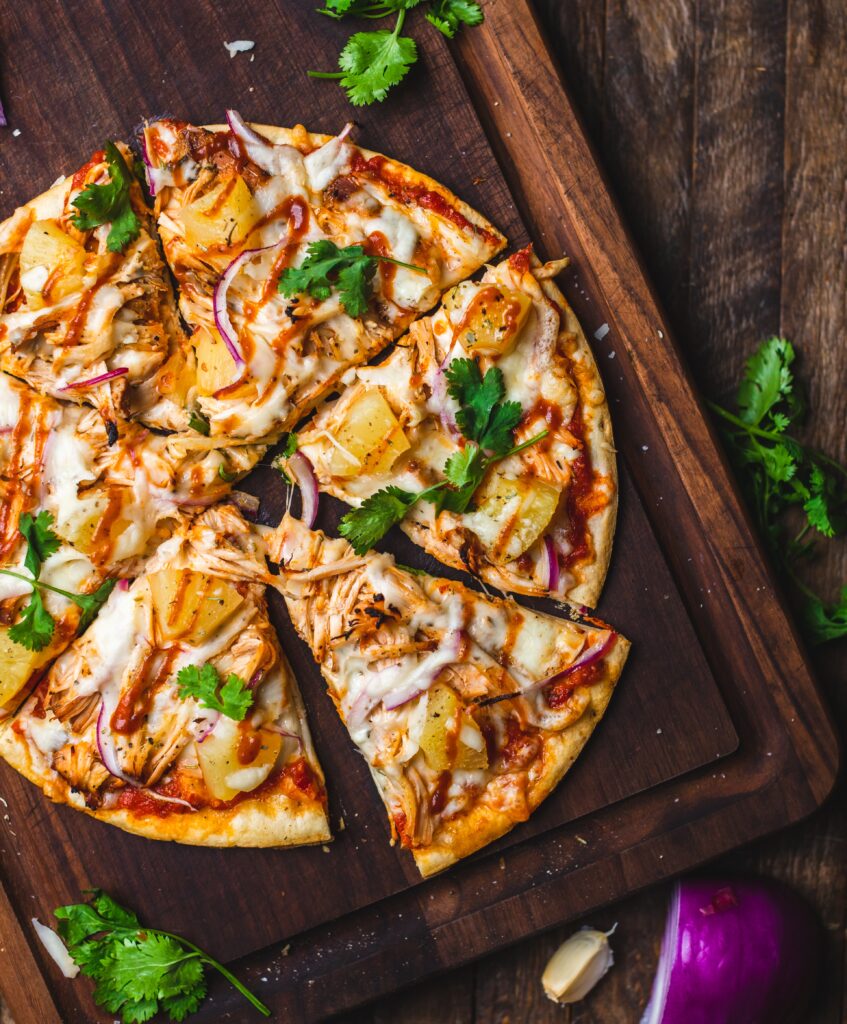
Mindful eating for diabetes

Next, what are you doing when you eat? Are you shoveling in food while you catch up on the latest episodes of your favorite show?
How about while you are working at your computer? Or taking a scroll through social media?
Confession…I’ve done all of these. When I became an intuitive eater, one major change I had to make was being mindful when I was eating. No more distractions.
Rather, I’m focused on my meal—able to focus on the enjoyable food and my fullness cues. I’ve gotten used to eating in a separate area from my TV and computer.
So no gobbling popcorn while I watch 1923, as it doesn’t even cross my mind. This habit took a while to break, even though most of my late-night eating was not hunger-related!

Experiment with intuitive eating and diabetes management
Why don’t you try it? Allow yourself to eat your favorite foods. Honor your hunger. Stop when you are full.
Make sure you are nourishing your body with nutrient-rich foods that improve your health. But don’t restrict or leave certain foods forbidden.
Eat regular meals and snacks without distraction and trust that your body will self-regulate.
A diagnosis of diabetes does not mean a life full of restrictions. See what happens to your glucose levels, mood, and energy levels when you let go of dieting and improve your relationship with food.
You are not alone. I can guide you through the process of letting go of dieting while managing your diabetes.
References
- Busetto L, Bettini S, Makaronidis J, Roberts CA, Halford JCG, Batterham RL. Mechanisms of weight regain. Eur J Intern Med. 2021;93:3-7. doi:10.1016/j.ejim.2021.01.002
- Colombarolli MS, de Oliveira J, Cordás TA. Craving for carbs: food craving and disordered eating in low-carb dieters and its association with intermittent fasting. Eat Weight Disord. 2022;27(8):3109-3117. doi:10.1007/s40519-022-01437-z
- Soares FLP, Ramos MH, Gramelisch M, et al. Intuitive eating is associated with glycemic control in type 2 diabetes. Eat Weight Disord. 2021;26(2):599-608. doi:10.1007/s40519-020-00894-8
- Allison KC, Hopkins CM, Ruggieri M, et al. Prolonged, Controlled Daytime versus Delayed Eating Impacts Weight and Metabolism [published correction appears in Curr Biol. 2021 Feb 22;31(4):908]. Curr Biol. 2021;31(3):650-657.e3. doi:10.1016/j.cub.2020.10.092
- Papelbaum M, de Oliveira Moreira R, Coutinho WF, et al. Does binge-eating matter for glycemic control in type 2 diabetes patients?. J Eat Disord. 2019;7:30. Published 2019 Sep 6. doi:10.1186/s40337-019-0260-4
- Epstein LH, Carr KA. Food reinforcement and habituation to food are processes related to initiation and cessation of eating. Physiol Behav. 2021;239:113512. doi:10.1016/j.physbeh.2021.113512
- Reichenberger J, Schnepper R, Arend AK, Blechert J. Emotional eating in healthy individuals and patients with an eating disorder: evidence from psychometric, experimental and naturalistic studies. Proc Nutr Soc. 2020;79(3):290-299. doi:10.1017/S0029665120007004
- van Strien T. Causes of Emotional Eating and Matched Treatment of Obesity. Curr Diab Rep. 2018;18(6):35. Published 2018 Apr 25. doi:10.1007/s11892-018-1000-x
- Martín-Peláez S, Fito M, Castaner O. Mediterranean Diet Effects on Type 2 Diabetes Prevention, Disease Progression, and Related Mechanisms. A Review. Nutrients. 2020;12(8):2236. Published 2020 Jul 27. doi:10.3390/nu12082236
- Basinger ED, Cameron SJ, Allen G. Stigma, Self-Care, and Intuitive Eating in Black Americans with Type 2 Diabetes. J Racial Ethn Health Disparities. Published online August 25, 2023. doi:10.1007/s40615-023-01772-6
- Ramos MH, Silva JM, De Oliveira TAV, et al. Intuitive eating and body appreciation in type 2 diabetes. J Health Psychol. 2022;27(2):255-267. doi:10.1177/1359105320950791
- Quansah DY, Gross J, Gilbert L, Helbling C, Horsch A, Puder JJ. Intuitive eating is associated with weight and glucose control during pregnancy and in the early postpartum period in women with gestational diabetes mellitus (GDM): A clinical cohort study. Eat Behav. 2019;34:101304. doi:10.1016/j.eatbeh.2019.101304
- Quansah DY, Schenk S, Gilbert L, et al. Intuitive Eating Behavior, Diet Quality and Metabolic Health in the Postpartum in Women with Gestational Diabetes. Nutrients. 2022;14(20):4272. Published 2022 Oct 13. doi:10.3390/nu14204272
- Wheeler BJ, Lawrence J, Chae M, et al. Intuitive eating is associated with glycaemic control in adolescents with type I diabetes mellitus. Appetite. 2016;96:160-165. doi:10.1016/j.appet.2015.09.016
Disclaimer: This information is intended as a self-help tool for your own use, at your own risk. My opinions do not reflect the values, thoughts, or opinions of the Academy of Nutrition and Dietetics or other professional health organizations.
About the author
Erin is a registered dietitian and diabetes educator with almost 20 years of experience. She specializes in weight-inclusive diabetes care and prevention, intuitive eating, fitness, and women’s health. She works as a consultant and writer in the health and wellness space. Erin is passionate about empowering people to manage their own health and to have peace with food.
